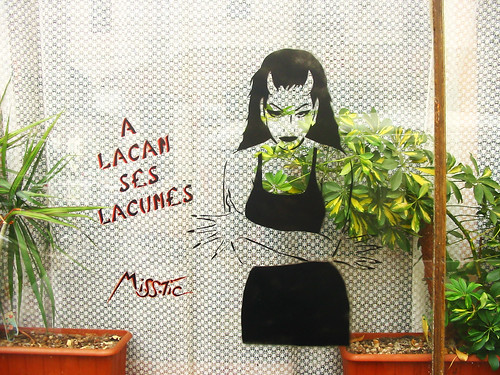 “The unconscious is structured like a language” – Jacques Lacan
“The unconscious is structured like a language” – Jacques Lacan
“We are in no way obliged to deposit our lives in their [the Lacanian fathers’] banks of lack, to consider the constitution of the subject in terms of a drama manglingly restaged, to reinstate again and again the religion of the father.” – Hélène Cixous [1]
~~~~~~~~~~~~~~~~~~~~
“Women come to writing, I believe, simultaneously with self-creation” – Carolyn Heilbrun [2].
There’s a sense of self that can emanate through writing. It is a transgressive self, a shifting, slippery self that doesn’t have to have one single constituency, is not beholden to one instantiation of a single and stable I. Continued writing practice can open a path to this consciousness.
Latina author Maria Lugones, shifting identities as she moves among the various communities she inhabits, describes a feeling “of being a different person in different ‘worlds’ and yet of having memory of oneself as different without quite having the sense of there being an underlying ‘I.’”[3]
There are ways, of course, in which this can be intensely painful, yet it does not have to be a uniformly negative experience, however–particularly when we are writing for self-creation or self-discovery. On the page I have felt it to be quite liberating. We are ever-changing. We are–I am–never the same from one moment to the next. All my meanings are always already changing–and so are yours and so are yours. Today you are new and old. Nothing is ever not changing in you. We are always never the same. The girl or boy who was raped is/not you. The adult who (was) fucked is/not you. We are/not the same. Not parenthesized, not encapsulated. We practice writing to know ourselves changing.
~~~~~~~~~~~~~~~~~~~~~~~~~~~
“Write! and your self-seeking text will know itself better than flesh and blood […] When I write, it’s everything that we don’t know we can be that is written out of me, without exclusions, without stipulation, and everything we will be calls us to the unflagging, intoxicating, unappeasable search for love. In one another we will never be lacking.” Cixous [1]
Thank you for the ways you allow yourself to unfold and enact, instantiate, moment after moment after moment after moment. Thank you for the creation of your words.
~~~~~~~~~~~~~~~~~~~~~~~~~~~
[1] Hélène Cixous, The Laugh of the Medusa (Keith Cohen and Paula Cohen, trans.) Signs 1(4), 1976, 875-893.
[2] Carolyn Heilbrun, Writing A Woman’s Life, 1988, p 117)
[3] Maria Lugones, “Playfulness, ‘World’-Traveling, and Loving Perception. In Tomoko Kuribayashi and Julie Tharp (eds.), Creating Safe Space: Violence and Women’s Writing. Albany, NY: State University of New York Press, 1998, p 174.
